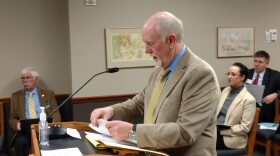The House has passed a bill that could permanently lower North Dakota’s oil and gas tax rate and eliminate any further tax cuts that are pegged to the price of oil.
It passed 57 to 32.
The bill was introduced to the state House of Representatives on Friday. At a House committee hearing Monday, Republicans said the bill would provide the industry, and the state, with greater stability.
Emily Guerin explains.
GUERIN: Ever since the legislative session began in January, elected officials around the state have been anxiously watching the price of oil. If it stays below about $55 for five straight months, oil companies get a huge tax break. While that’s great for the industry, it means the state loses $100 million a month until the price of oil rises above $55 for another 5 straight months. At current prices, it’s looking likely that tax break, or the big trigger as it’s called, will happen on June 1. That has Brent Sanford worried.
BRENT SANFORD: It’s terrifying to think of the trigger happening.
GUERIN: Sanford is the mayor of Watford City, in the heart of the oil patch. He says he depends on state oil tax money to fund infrastructure projects he needs to keep up with the oil boom. So he is in favor of House Bill 1476. The bill would eliminate the big trigger tax cut and permanently lower oil tax to 9 and a half percent. House majority leader Al Carlson says having massive tax breaks tied to the price of oil creates too much uncertainty.
AL CARLSON: We thought that it would be beneficial to have a stable tax system for the state of North Dakota and the industry.
GUERIN: But here’s the catch: the bill will only take effect if oil prices are low enough to trigger that big tax cut on June 1. So the bill to “stabilize” the tax rate is itself pegged to the price of oil. Ron Ness of the North Dakota Petroleum Council says that’s still too up in the air.
RON NESS: 40 days from today, we have no idea what our tax rate’s gonna be.
GUERIN: That’s why he’d like the legislature to cut the tax rate to nine percent -- right now.
NESS: If this is good tax policy, lets just do it. Let’s not do it just if the triggers hit, let’s just do it.
GUERIN: But many opponents of the bill wanted to slow the process down. Democratic Minority Leader Mac Schneider is worried the bill was introduced too last minute, without enough information about the long-term financial impact.
MAC SCHNEIDER: As an alternative, I would ask that all of us focus in on what we agree is the problem, that’s the bluntness of the triggers.
GUERIN: Schneider said lawmakers could reform the big trigger to cut less deeply into state revenues. Keeping part of it could make it more affordable for the industry to start drilling again. Others wanted to do away with the trigger tax cuts entirely and keep the oil tax rate high. Mark Fox is chairman of the Mandan, Hidatsa and Arikara Nation, which produces about 30% of the state’s oil.
MARK FOX: For us oil has been both a blessing and a curse.
GUERIN: Fox said the reservation was not prepared for the influx of people, the increase in crime and traffic, and the spills. He said the current 11 and a half percent tax rate isn’t high enough to deal with problems created by the boom, so 9 and a half is out of the question.
FOX: To think that that’s going to be enough revenue to address our problems, it will not.
GUERIN: Fox said if the state passes House Bill 1476, he may pull out of an agreement that allows oil companies to avoid being doubly taxed by the tribal and state government, an action that industry officials say would be devastating.
For Prairie Public, I’m Emily Guerin.


